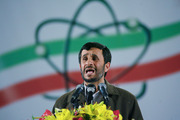 New York
New York
The reaction of the Obama administration to the discovery of a secret, underground Iranian nuclear plant strongly suggests, as the Washington Post points out, that the administration has given up on engagement. Attempts to engage with the Iranian regime were always likely to be futile. But Washington had to show the international community, and the American public, that it had tried. The criticism you can make of the administration is that its effort took too long, nine months when the Iranian nuclear clock might have as little as 18 months left on it.
Now, the focus turns to sanctions. Can the UN pass sanctions that block gasoline imports, a vital first step in increasing the pressure on the regime? Russia appears to be taking a tougher line on Iran. But China still sounds as if it is opposed, and Chinese companies are now filling the gap left by other companies pulling out of exporting gas to Iran.
The problem with the UN when it comes to issues like Iran is that the UN was, reasonably enough given the world situation in 1945, designed to slow things down and to make action hard. Agreement had to be reached between the major powers before anything could be done. But in the modern world, we need an institution that is more pro-active if we are to mantain international security. If the UN is unable to impose sanctions that are tough enough to make the Iranian regime rethink its nuclear ambitions, then the likelihood of Israel—or possibly a Western coalition—dealing with the threat on their own through force will, understandably, increase.







Comments